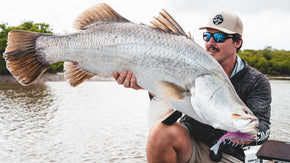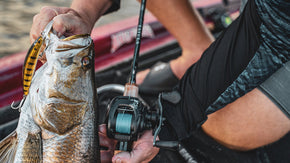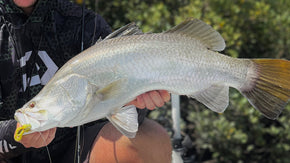Posted 30th July 2025
Ten angling mistakes to avoid


By Robert Thornton
We recently looked at ten tips for angling success, now we’re going to look at ten common mistakes to avoid. Success on the water comes down to a bunch of little things you do, but in equal measure are things you don’t want to do. There are ‘no-nos’ that apply to the mental, mechanical and theoretical aspects of fishing, and in most cases the mistakes are easy to make but also easily avoid once identified.
In this blog we’ll look at ten common angling mistakes and how to avoid them. Bear in mind this isn’t just for beginners either, and includes mistakes that I and other experienced anglers still occasionally make.
MAKING MISTAKES IS HOW WE LEARN
It’s true that mistakes help us to learn, and learning from mistakes is a normal part of learning anything. What this blog will do is identify common mistakes that I and many others have made over the years to hopefully save you from making them. With that said, every angler inevitably makes mistakes, but I feel that mistakes can be a positive thing if we learn from them.
TEN ANGLING MISTAKES
1. Don’t leave it to the last minute
This is a lesson I’ve learned too many times. Leaving your preparation to the last minute and even doing your knot-tying, rig-making and tackle selection down at the water can cause problems. Having to do basic prep once at the fishing spot can lead to rushing, because you’re more focussed on getting a line in the water than taking the time to do things properly. The best advice I can give is to get it done the night before, or even a few days in advance. I understand that some anglers prefer not to tie a lure on until they have examined the conditions on the day, but at the very least you’ll want to have things like leaders, a selection of lures, and your basic kit for the day sorted in advance so you’re not wasting valuable fishing time getting ready.
2. Don’t go in blind
Building on the first one, this ensures you at least have a basic idea of what to expect and can therefor plan accordingly to maximise your time on the water. Things like weather forecasts, tide charts and barometric pressure readings give you vital information about the sort of gear to bring and the techniques to try. Even if you’ve never been to the spot before, it’s easy to get a decent ‘lay of the land’ with online maps, and from here you can build an idea of how environmental factors may be affecting the area at your chosen time. Going in blind is always going to make things harder for you, but with modern technology you simply don’t have to anymore.

3. Don’t wait for the perfect day
My dad always used to say to me “we can’t all be fairweather fishermen”, and this is so true for anyone who wants to become a better angler. While I’ve been guilty of waiting for optimal conditions – or at least what I thought were optimal conditions – I limited myself in a few ways. I assumed that these ‘optimal conditions’ were the best times to fish, and my fishing then became limited to specific times. In the process, I limited my learning of my target species, and before long I only knew how to catch some species when things were just right for me. Granted, most of us don’t like fishing during storms and strong winds, but it’s a mistake to let anything less than a beautiful day keep you off the water. Fishing under a range of conditions is a great way to learn more about a specific area or species. Once you’ve learned to fish in varying conditions, suddenly you end up with more windows to fish! I talk about this in more depth here.
4. Don’t leave fish to find fish
You may have already heard this one, and it’s another one of those mistakes that many experienced anglers (myself included) still make. I can’t tell you how many times I’ve made the decision to leave biting fish to go find better fishing somewhere else, only to regret it once I realised the grass wasn’t greener. Worst of all, sometimes I’ll head back to where I was originally fishing, only to find that the fish that were there previously had moved while I was gone. If I’d stayed there, I may have been able to work out where they’d moved to.

5. Don’t change what’s working
This one ties in nicely to the previous one, and it follows the old mantra of ‘if it ain’t broke, don’t fix it’. Many times, I’ve tried to make a good thing even better by changing it up, whether it’s a lure colour, lure type, retrieval speed, the angle of my cast, and so on. Sometimes the change can pay off, but quite often it just puts the fish down. If you think about it from the fish’s perspective, imagine the thing that you really want to eat is finally presented to you, only to have it followed up by something different and unappetising a few minutes later. Not only can this turn the fish off your lures or baits, it can also disrupt the flow of the fishing session. The lesson is simple: if you’ve found something that works, and you want to keep catching fish, don’t change it unless you have to.
6. Don’t give up
Perseverance and determination are assets for anglers, but when we talk about ‘giving up’ it’s important to make some distinctions. ‘Giving up’ and going home because it’s getting late are different. To me, giving up means stopping fishing and leaving to go home, despite there still being plenty of available fishing time left. Everyone has to go home eventually, but if you’re consistently letting poor results prematurely make that decision for you, this one’s for you. Good results come to those who push through difficult times, who sift through their arsenal of tricks to find what’s working and use up every available minute on the water to uncover that secret.

7. Don’t discredit others
Talking to and extracting information from other anglers is something we covered in the ten tips for angling success blog, however the flip side of that is deciding what information is worth taking on. While tall tales are a part of fishing, I’ve learnt from experience that sometimes even the tallest sounding tales can be true, and discounting, discrediting and disregarding info from fellow fishers is a bad habit to get into. If someone suspects that you’re waving away their advice, they might not be willing to offer any to you again, and thus a valuable source of information is lost. As we’ve said before, not everything you hear is going to be helpful, but I’m a firm believer that every angler has at least something to contribute to the vast pool of knowledge in the angling world.
8. Don’t forget about sun safety
Moving over to the practical side of things, sun safety should be a big consideration when fishing in Australia. Fishing leaves us very vulnerable to sun damage, not only because of the prolonged periods we spend outside doing it, but also because of how easy it is to forget about your own safety when concentrating with laser-focus. It takes a level of discipline to break from the task at hand to re-apply sunscreen, drink water, check that you don’t have any unprotected skin showing and so on. With that said, sun safety doesn’t have to eat into your fishing, and with appropriate apparel you can save yourself lots of time. Things like sun gloves, neck scarves, sun glasses and outdoor-specific fishing jerseys are excellent for preventing sun damage without having to rely on sunscreen. Additionally, they are purpose-built to be lightweight, breathable and fast-drying, giving you the peace-of-mind to stay out for longer without interrupting your fishing too much.

9. Don’t forget to wash up
We covered the importance of caring for your gear in this blog, but it’s worth stressing once again the benefits of washing up after a session. Of course, caring for your tackle happens at all stages of fishing, however the steps that come immediately after a fishing session are often skimped on. Whether this is because of fatigue after a long day on the water, or other commitments forcing people to overlook these important steps, the fact is that aftercare extends the life of tackle by years. If you’re not spending at least 10-15 minutes washing your rods, reel and terminals after a fishing trip – especially a saltwater trip – doing this will save you money in the long run.
10. Don’t get stuck in your ways
As we get older, many of us will get ‘stuck in our ways’, and in fishing it’s easy to develop a narrow-minded approach when we find a few things that work for us. While sticking with what works is good advice generally, taking this to the extreme can blind us when there are better options available. Furthermore, when something that has worked before suddenly stops working, an angler who’s stuck in their ways will struggle to adapt to the situation. Sometimes we just need input from someone else with a different perspective. Good anglers never stop learning, and the best way to continue learning is to ensure we don’t get stuck in a particular way of thinking, and to always keep an open mind.
THE REAL MISTAKE IS NOT TRYING
All of us have and will continue to make mistakes on the water, but as we’ve already said, this is part of the learning process. By identifying these ten common angling mistakes, hopefully you’ll be able to avoid blunders that many of us had to learn the hard way. After that, the rest is up to you!
















